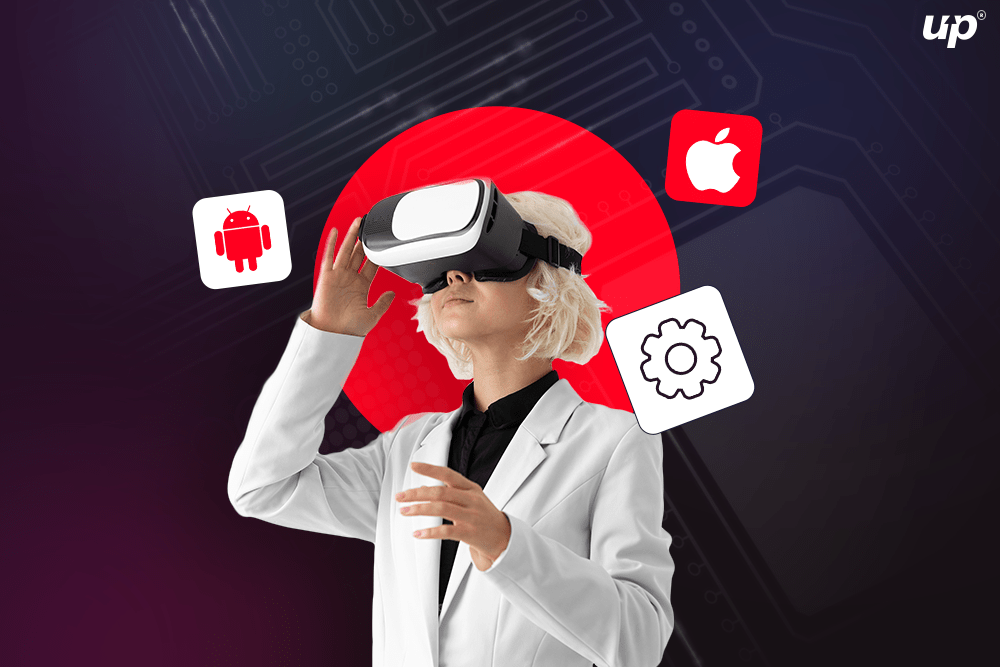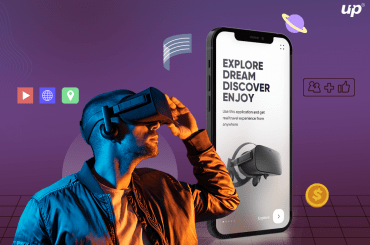With the incorporation of Augmented Reality (AR) and Virtual Reality (VR) technologies, the development of mobile apps has undergone a considerable transition in recent years. The way we use mobile apps has been completely transformed by these immersive technologies, resulting in a whole new level of user experience. In this blog, we’ll examine the amazing possibility of integrating AR and VR into mobile apps and the advantages they offer. In order to properly utilize these cutting-edge technologies, it is crucial to collaborate with a professional augmented reality app development company and virtual reality app development company.
The Rise of AR and VR in Mobile Apps:
Due to its capacity to completely merge the digital and physical worlds, AR and VR technologies have greatly increased in popularity. The availability of sophisticated sensors and the increased computing power of smart phones have made AR and VR experiences more available to mobile app development services for consumers. Mobile app developers now have a vast array of options thanks to AR and VR, including increasing purchasing interactions, revolutionizing educational systems, and expanding gaming experiences.
Enhancing User Engagement and Experience:
Mobile app developers may give customers rich and engaging experiences by including AR and VR. With augmented reality (AR), users can overlay digital content on the actual world to provide educational and entertaining aspects. In contrast, virtual reality (VR) provides an entirely imaginary environment and takes people to new dimensions. These innovations have the capacity to enthrall users, boost engagement, and make an impression that lasts.
AR and VR Applications in Mobile Apps:
The creation of mobile apps has expanded thanks to AR and VR technologies, which present a variety of options and uses. AR and VR technologies offer businesses around the world unprecedented opportunities to engage customers, boost productivity, and open up new revenue streams by creating immersive experiences, improving training and collaboration, and revolutionizing the way products and services are presented and experienced. Here are some crucial areas where integrating AR and VR into mobile apps can improve user experiences:
Gaming: By generating immersive and participatory experiences, AR and VR have completely changed the gaming business. Mobile games that use augmented reality (AR) can let players interact with virtual objects in their physical surroundings by superimposing digital content onto the real world. On the other side, virtual reality (VR) immerses users completely in a virtual environment.
E-commerce: AR integration in e-commerce apps allows users to visualize products in their real environment before making a purchase. Virtual try-on features for apparel, furniture placement simulations, and interactive 3D models enhance the online shopping experience, reducing customer hesitation and boosting conversions.
Education and Training: AR and VR have tremendous potential in the education sector. They can transform traditional learning methods by creating immersive and interactive educational experiences. Simulations, virtual field trips, and 3D models help students grasp complex concepts effectively.
Real Estate: AR and VR technologies enable users to explore properties remotely and experience virtual walkthroughs. This saves time and provides a more comprehensive understanding of the property, making it an invaluable tool for real estate agents and buyers alike.
Healthcare: Medical training, patient education, and therapeutic interventions are just a few of the applications of AR and VR in the field of healthcare. Medical practitioners can learn difficult procedures through VR simulations, while AR can deliver real-time data overlays during operations. Additionally, pain management and mental health therapies can be carried out in VR settings.
Education and Training: Apps for education and training have a lot of promise for AR and VR. They are able to design engaging, interactive learning environments that simplify and simplify complex ideas. While VR can replicate realistic teaching settings in disciplines like medicine, aviation, or engineering, AR can overlay information and 3D models onto textbooks or real-world items.
Tourism & travel: By offering virtual tours, interactive maps, and augmented information about sites and destinations, AR and VR can improve the trip experience. Users can virtually visit sites, see historical recreations, and get real-time information to enhance and simplify their vacation planning.
Partnering With Expert App Development Companies:
To harness the full potential of AR and VR in mobile apps, it is crucial to collaborate with a specialized Augmented Reality App Development Company and VR App Development Company. These companies possess the expertise and experience in leveraging these technologies effectively. They can guide you through the development process, ensuring seamless integration, and creating immersive user experiences.
Conclusion:
The integration of AR and VR in mobile apps has revolutionized the way we interact with digital content. These technologies have opened up new possibilities across various industries, enhancing user engagement and experience. As the demand for immersive experiences continues to grow, partnering with a professional Augmented Reality App Development Company and VR App Development Company becomes vital to stay ahead of the competition and provide users with truly revolutionary mobile app experiences. Embrace the power of AR and VR in your mobile app development to unlock limitless possibilities.












